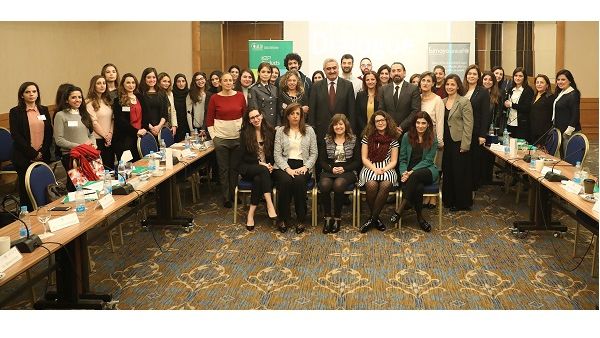Ministry of Public Health, Unicef Collaborate With K2P Center at AUB

In 2017, the child protection sector reported 10,825 child violence, neglect, abuse and exploitation cases in Lebanon who received child protection case management services, of which approximately 90% were of medium and high risk. This is just the tip of the iceberg, more children suffer in silence and were not able to seek and receive support.
Additionally, evidence from high quality local and international studies, compiled by the Knowledge to Policy (K2P) Center at the Faculty of Health Sciences at the American University of Beirut (AUB), showed that child abuse is associated with higher incidence of mental health disorders, eating disorders, sexually transmitted diseases, and increased mortality.
Due to the magnitude of the problem and the importance of the availability of policies and practices in healthcare institutions in Lebanon related to the prevention, early identification, management and referral of child abuse cases; and in line with the Ministry of Public Health’s strategy to improve the quality of healthcare institutions in Lebanon, the Ministry decided to develop a plan of action for child protection in healthcare institutions.
In this context, the Ministry of Public Health, in collaboration with “himaya”, UNICEF, and K2P Center at the Faculty of Health Sciences at the American University of Beirut (AUB), held a Policy Dialogue aiming at Strengthening Child Protection Practices in Healthcare Institutions in Lebanon, on February 23rd 2018 at Rotana Gefinor, Beirut.
The K2P dialogue convened key stakeholders including the General Director of the Ministry of Public Health, Dr. Walid Ammar, Mrs. Nisrine Tawily and Mr. Simon Nehme from the "Child Protection Program", at UNICEF, Mrs. Salam Chreim, Head of Department of Juvenile Protection at the Ministry of Social Affairs, Mrs. Hala Abou Samra, Head of Juvenile Justice Department, at the Ministry of Justice, Captain Dr. Rima Abi Haidar, Head of the Medical Center at the Internal Security Forces, Dr. Bernard Gerbaka, Director of the Child Protection Unit at Hôtel-Dieu de France, Ms. Hilda El Khoury, Director of Counseling and Guidance bureau at the Ministry of Education and Higher Education, Dr. Waleed Ikram, Representative of the United Nations Fund for Population Activities (UNFPA), Ms. Nadia Badran, President of the Syndicate of Social Workers, as well as representatives from the Syndicate of hospitals, Order of Nurses, Order of Midwives, academics, organizations and researchers.
The dialogue was supported by a K2P Briefing Note, which brings together the best available local, regional and international evidence, and offers recommendations for action. The Briefing Note was circulated to all related policymakers and stakeholders, prior to the dialogue, to inform the discussion and allow an active and focused discussion.
K2P Director and dialogue facilitator, Dr. Fadi El Jardali, elicited participants’ input on the overall problem and its underlying factors. Participants discussed the child protection arrangements in Lebanon with a focus on healthcare institutions. Dr. Walid Ammar, general director of the Ministry of Public Health stressed that “initiating discussions on child protection are the first step to strengthening child protection practices in healthcare institutions”. Ms. Lama Yazbeck, executive director of himaya, highlighted, "We are delighted that child protection actors are meeting today to discuss the integration and strengthening of child protection practices in the health sector ''. Also, Mr. Simon Nehme Child Protection Program officer at UNICEF mentioned, ‘’ Preventing violence against children requires the efforts of many. UNICEF sees this policy dialogue as a key step in the right direction and we are encouraged by the commitment towards the protection of children demonstrated by the Ministry of Public Health”.
Dialogue participants deliberated over 4 evidence-informed recommendations from the Briefing Note:
Recommendation 1: Strengthening child protection practices in healthcare organizations through related policies, procedures, standards and resources.
Recommendation 2: Developing and implementing tools and strategies in healthcare organizations for child abuse early recognition and management.
Recommendation 3: Enhancing the knowledge and education of providers to recognize, refer, or manage child abuse.
Recommendation 4: Promoting social behavioral change in relation to child protection.
Participants agreed on the importance of achieving Goal 16 of the Sustainable Development Goals relating to prevention of sexual, psychological and physical abuse targeting children.
Background Information
American University of Beirut
Founded in 1866, the American University of Beirut is a teaching-centered research university based on the American liberal arts model of higher education. AUB has over 9,000 students and over 1,200 instructional faculty members. The University encourages freedom of thought and expression and seeks to graduate men and women committed to creative and critical thinking, lifelong learning, personal integrity, civic responsibility, and leadership.






